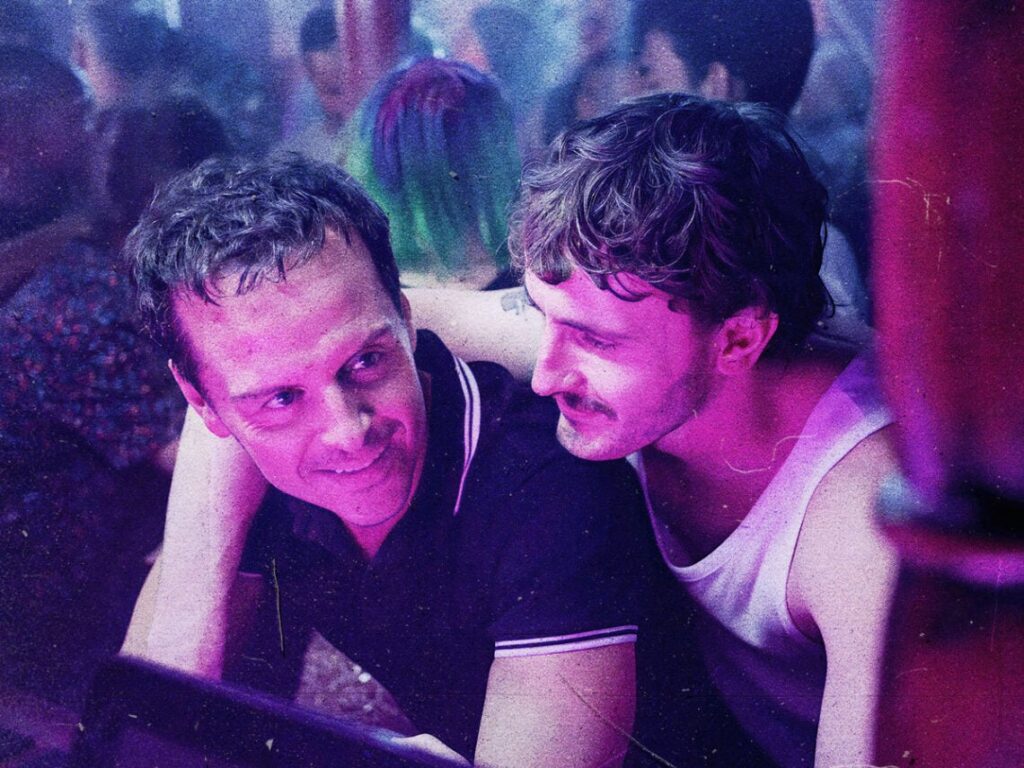The meaning of grief and prejudice in ‘All of Us Strangers’
 Posted On
Posted On
(Credits: Far Out / Searchlight Pictures)
There’s nothing quite like it, the hushed and babbled precession of a British cinema crying in unison. It is concise and stifled by virtue of our stiff-upper-lipped disposition, like an orchestra discreetly tuning up, before we can get home, somewhere safe beyond the glances of strangers and have a teary crescendo, or else pop to the pub and forget about the dammed flood. In this regard alone, All of Us Strangers reminds you of the power of cinema.
It also reminds you of the power of love. If that sounds cheesy, then you haven’t seen the film. Profundity is dealt with in a humanised and understated manner, sweating upon the emotions of the small stuff, such as the comforting presence of a partner upon your back as you slumber or a silly little remark about sitting like a girl that somehow stays with you for years, shackling you to your past in a manner that is both entirely innocuous, but formidable.
So, it seems fitting that one of the most affecting lines is also mumbled so casually it barely goes noticed: while discussing recent societal developments when it comes to Queer prejudice, Andrew Scott’s character, Adam, states that things have gotten far better, but also utters something along the lines of, ‘But it doesn’t take much to bring that feeling back’, relating to how close the brutal, homophobic days of the past linger, and how we’re still very much in its damning shadow.
This is why we must be careful with the remarks and etiquette we often shrug off as harmless—we’re perfectly willing to relate to how it’s possible that a continual comment like, ‘Stop crossing your legs like a girl’ might stay with you for your whole life in a shroud of strange shame, but when it comes to minor prejudicial remarks in a broader societal sense, we often dismiss them and claim that those on the receiving end should lighten-up.
The film tenderly reminds us that we all must simply take more care and have greater empathy with the struggles of others, no matter how small they may be. Because, in time, we may live to regret, for instance, not comforting a crying child because it is a reality that proves difficult to face, or even comically not quite being able to say boyfriend and opting to go with a ‘special friend’ instead.
“It seems to me, that if we love, we grieve. That’s the deal. That’s the pact. Grief and love are forever intertwined. Grief is the terrible reminder of the depths of our love and, like love, grief is non-negotiable.” – Nick Cave
It also reminds us about how all of this intersects with grief. That the true price of grief is not in the loss or the trauma of the end but in the moving on, the fact that we will go on without them, haunted by the things that haven’t been said. We have to achieve without them, we have to struggle without them, we have to discover bands that they would’ve loved without them, we have to visit places and do things that remind us of them.
And yet, in the constant flux of the film’s emotional philosophy, it also reminds us that the impermanence of life is what makes it beautiful—that we are all here for a finite fraction of time, and yet we continually find strangers who are willing to help us get through it. To coin another Nick Cave quip, it’s about letting love in, even if you’re scared because you don’t know when it is going to be taken away.
As Andrew Haigh, the writer and director behind All of Us Strangers put it in our interview with him: “It is about trying to connect, trying to know people, getting them to know you, being compassionate to each other. That is what love is about.”
[embedded content]


